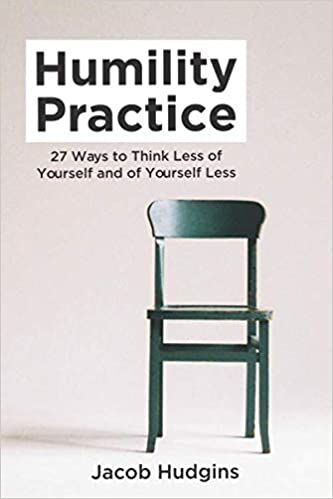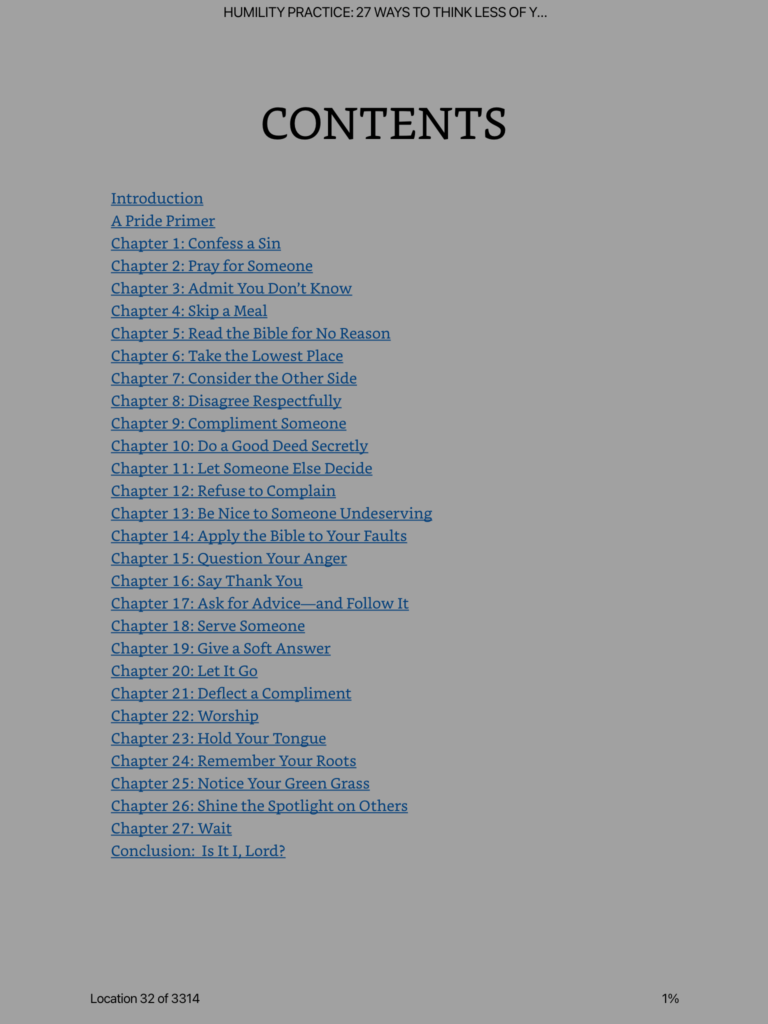
This week, I stumbled across this title after Googling “how to be humble.” Let’s just say I was struggling with self-control and sexual integrity and I remembered a telling quote from Heath Lambert’s Finally Free, “Only arrogant men look at pornography.†C.S. Lewis described pride as “the great sin,” which “leads to every other vice: it is the complete anti-God state of mind.” Theologians throughout history have agreed: behind every evil thought or action is a proud heart.
Pride isn’t loudness; it certainly isn’t assertiveness. Pride isn’t high social status or power. Pride is a heart state that rich and poor; powerful and weak; intelligent and simpleminded people are liable to possess. Sermons and spiritual devotions often major in the “what” and “why” and minor in the all-important question of “how.” Humility Practice stands out for its practical orientation. In it, Jacob Hudgins details numerous actions people can do on a daily basis to grow in humility. As it relates to sexual integrity, humility is an offensive strategy we can use when we aren’t actively being tempted.
Jacob Hudgins has been in full-time ministry since 2004 and is based out of College Station, Texas. In Humility Practice, he quotes extensively from the Bible to illustrate his arguments. Most of the 27 practices, however, have universal application that anyone can benefit from independent of their religion.

Humility Practice might as well be a book about happiness: “27 ways to be happier.” I look forward to implementing many of them in the coming days.
Without further ado, check out the Table of Contents and 40 of my favorite quotes from the book that I saved while I was reading! I recommend grabbing a copy from Amazon for only a few dollars.


40 Best Quotes From “Humility Practice: 27 Ways To Think Less of Yourself and of Yourself Less” by Jacob Hudgins
What is the focus of a God like that? What interests him? “But this is the one to whom I will look: he who is humble and contrite in spirit and trembles at my word.â€
1
“A haughty look†is number one on Solomon’s list of seven things the LORD hates (Prov 6:16-17). “Pride goes before destruction, and a haughty spirit before a fall†(Prov 16:18).
2
In the New Testament, Jesus frequently condemns pride with one of his favorite sayings: “Everyone who exalts himself will be humbled, but the one who humbles himself will be exalted†(Luke 18:14, Matt 23:12, Luke 14:11). Implicit in his statement is the idea that this is more than just the natural consequence of pride. God is the one who does the exalting and humbling.
3
Later in the New Testament, James and Peter both quote from a statement in Proverbs: “God opposes the proud, but gives grace to the humbleâ€(1 Pet 5:5, James 4:6). God makes the proud his enemies. His favor is for those who are willing to lower themselves before him.
4
Even as modern American culture tends to reward the brash and cocky, we still know that this is a difficult trait to live with. Proud people think they always know best. They cannot work in teams. They do not relate well to others because others must either respect them or rival them. They do not grow. They cannot take advice. They do not respect others’ ideas. They are hard to talk to.
5
In his book The Road to Character, David Brooks compiles a set of disturbing surveys: On a narcissism test containing statements like “I like to be the center of attention†and “Someone should write a biography about me,†the median narcissism score has risen 30 percent in the last two decades.
6
Most of the practices detailed in the book center around a few stubborn aspects of pride: self-focus, condescension, and ingratitude.
7
Pride manifests as a preoccupation with ourselves. We spend the majority of our time concentrating on our own goals, hopes, and dreams. We constantly take our own emotional temperature to discover whether we are happy or sad or bored or frustrated. We think so much of ourselves that we assume that there is little to discover outside ourselves. We begin to value our own thoughts and opinions more than those of others. We begin to think we are great.
8
In advanced cases, pride shows up as the belief that the ordinary rules of life don’t apply to a person as great as me… Paul speaks to this as well: “Do not be deceived: God is not mocked, for whatever one sows, that will he also reap. For the one who sows to his own flesh will from the flesh reap corruption, but the one who sows to the Spirit will from the Spirit reap eternal life†(Gal 6:7-8).
9
Humility comes when we stop pretending that everything is normal and own our sin.
10
Confessing sins is a challenge because we are often engaged in image management. We want people to like us and think well of us… Yet if we confess our sins, we deliberately expose to others our most shameful secrets. We turn that entire process upside-down.
11
There is also something liberating about confessing to our brothers and sisters. We don’t have to hide anymore. We can deal with the real issues we are struggling with. We can talk about them. And we always discover that others wrestle with the same things.
12
Of course, this fixation [on ourselves] can corrupt our service to God. Our spiritual work and prayer lives become merely about God and us. We can neglect the vital role God intends others to play in our service and maturity. Humility comes when we pray for someone else.
13
Praying for others requires deep thought about what would be best for them.
14
Fasting helps us to regain control over our impulses. One of the biggest problems in modern America is our inability to deny ourselves and take care of our bodies.
15
Fasting indicates that all is not well. Like Ezra (and many others in Scripture), we go without food to seek God’s help. Or like Nehemiah (and many others in Scripture), we go without food to mourn our sin. Whatever the motivation, it is not business as usual. And in both cases fasting is a way we express our need for God.
16
Focusing this way on Scripture—where we come to the Bible to learn about God—reminds us that we are not the center of the universe. God’s story involves many people and a long period of time in many different places… There is a bigger story going on than ours.
17
Disagreeing respectfully is hard because we just tend to focus on either ourselves or the content of what we are trying to say [instead of the other person].
18
One challenge of complimenting others is that we carry emotional baggage into the situation. Sometimes we’ve been hurt, so we don’t want to speak positively. Sometimes we’re jealous, so we can’t speak positively. In such states, our speech reflects the venom in our own hearts.
19
Paul not only encourages Christians to quit complaining, but also notes that it will make us different from the world. “Do all things without grumbling or disputing, that you may be blameless and innocent, children of God without blemish in the midst of a crooked and twisted generation, among whom you shine as lights in the world†(Phil 2:14-15).
20
We tend to be nice to those who are nice to us. We have warm feelings toward nice people because they have made us feel good. There is also a principle of reciprocity at play: our kindness is a down payment on future kindness from them. Undeserving people offer no such guarantees; in fact, we can almost be certain of the opposite.
21
Insistence on vengeance stems from pride. Every minor offense done to me must be avenged (and avenged by me). When others hurt or upset me, they should suffer! Meanwhile the harm and hurt I have caused others should be forgiven and forgotten.
22
History is littered with corrupt religious figures, but the problem is not merely hypocrisy. Somewhere along the way, their religion no longer stems the tide of their pride. The tragedy is that in their pursuit of God, they fall headlong into the sin that is most abhorrent to him.
23
Sometimes we confuse identifying our faults with changing them. There is a huge difference between admitting some character flaw (“I’ve got a temper!â€) and actually working to change it.
24
Don’t assume your anger is appropriate. Question your anger.
25
We must admit that the vast majority of the times we get angry, it is about us… The intensity of our emotions clouds our judgment. Questioning our anger will help us gain distance from our feelings and the assumption that we are right. We submit our feelings to the will of God… Questioning our anger will give us clarity about why we are responding the way that we are. [It] helps us see that very often our anger stems from pride, jealousy, and selfishness.
26
Some things are expected and don’t deserve a thank you. We don’t thank our boss for our paycheck. We don’t thank the electric company for providing our service. We don’t thank our friends for being nice. The danger is that we begin to think that gratitude doesn’t have a place in everyday life.
27
Saying thank you teaches us that we are not self-made.
28
Our self-fixation makes service unnatural. We tend to look at and think about our own problems. To some extent, we must do this; it is part of taking care of our own business and bearing our own load. But when the bulk of our attention, energy, and time is spent on our own pursuits, it is easy to forget that others need our help, care, time, and consideration.
29
Service is the answer to a number of spiritual ailments. Very often, if we find ourselves consumed with anxiety, wracked by doubt, beset by laziness, discontent and ill-at-ease, it is because we are not serving others.
30
Soft answers show that we value resolving (or avoiding) the conflict more than we do advancing our own agenda. We are actively pushing our goals, thoughts, and agendas into the background so that we can seek peace together.
31
Forgiveness is about the steadfast determination to not let other people’s evil stick in our hearts, corrupting and embittering us.
32
But more than just sin, a lot of the hurts we experience are personal slights, ugliness, and grudges. Some of these things never get aired publicly. They are not headline sins, just the bumps and bruises of everyday life. We practice humility by learning to let it go.
33
When we let things go, we give up our right to condescend to those who have hurt us. We cede our right to be angry. We refuse to remain victims. We declare ourselves on equal footing with the person who has hurt, inconvenienced, or upset us. It’s over. We have let it go.
34
Letting it go frees us up to see purpose in the things that have happened to us.
35
One of the greatest steps we will ever take toward humility is sincerely worshipping God… Worship refocuses us, reminds us of divine priorities, gives us an outlet for our gratitude, and demands that we reverence things that are not directly connected with our egos.
36
The main obstacle to worship in our time is our relentless focus on entertainment. Worshipping God is just not as exciting as whatever games, movies, or hobbies we are used to consuming. Those things are tailored to draw our interest and please us. Worship is far different. It does not promise entertainment or gratification. It promises humility, truth, and an alternative perspective.
37
Remembering our physical roots—our youth, raising, and mistakes of immaturity—helps us here too. When we recall that we have been foolish, ignorant children—physically and emotionally fragile—it keeps us from feeling that we are superior to others. . . Remembering our roots also takes us down an important path of acknowledging the influence of others. We are the product of a great number of people who have taken an interest in our betterment and growth.
38
In a consumer economy, every advertising message tells us that our lives are miserable and incomplete because we lack their product or service. Social media broadcasts how great the lives of all of our friends are—their perfect children, awesome vacations, and fun parties (minus all their hard times, of course).
39
Waiting means that our concerns and needs are not that urgent. We can live with discomfort. It is often through this discomfort that we strengthen our ability to endure difficulty (James 1:2-4). We also appreciate things far more when we’ve had to wait to get them.
40
When Scripture describes and condemns pride, the goal is not simply for us to feel better about God judging people we don’t like. The goal is that we sit alongside the disciples and ask, “Is it I, Lord?†Could he be talking about me?
41

